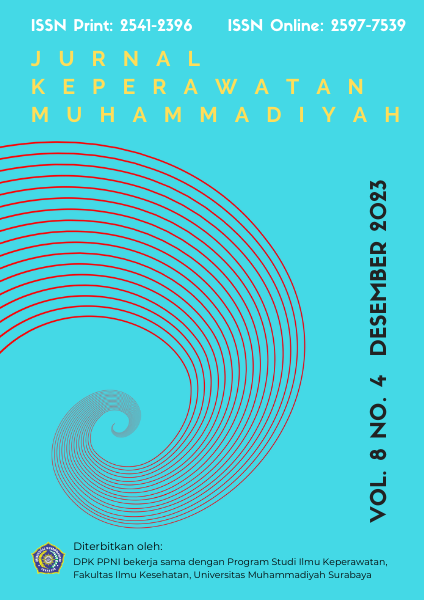Differences in Family Immunity in Preventing the Spread of Infection in Healthy Families and Confirmed COVID-19
DOI:
https://doi.org/10.30651/jkm.v8i4.22233Kata Kunci:
COVID-19, family immunity , Infection PreventionAbstrak
Background: Coronavirus Disease 2019 (COVID-19) causes social transformations that can shake the existence of individuals and families so that they become vulnerable or have the potential to not have Family Immunity. Objectives: The purpose of this study was to analyze differences in family immunity in preventing the spread of infection in healthy and confirmed families of COVID-19. Methods: A case control research design to compare two groups regarding family immunity to the prevention of COVID-19 infection, which was carried out in the city of Surabaya, Indonesia in August 2021 – March 2022. A total of 104 respondents were recruited using convenience sampling. Data were collected using a questionnaire and analyzed using SPSS version 21 with Chi Square test. Results: Family immunity shows better results in healthy families with 43.3% better family belief system status, 28.8% good organizational patterns, 38.5% better communication process and 36.5% better Controlling the spread of infectious disease. The results of the significance test showed that all P values 0.05 and calculated X2 results > X2, it can be concluded that all indicators are related to family COVID-19 status and can explain the family immunity variable. Conclusion: Family immunity in the healthy family group and the confirmed COVID-19 group showed different results, families with healthy conditions had much better family immunity than families who had confirmed COVID-19.
Referensi
Zu ZY, Jiang M Di, Xu PP, et al. Coronavirus Disease 2019 (COVID-19): A Perspective from China. Radiology. Epub ahead of print 2020. DOI: 10.1148/radiol.2020200490.
Xu K, Cai H, Shen Y, et al. Management of corona virus disease-19 (COVID-19): the Zhejiang experience. J Zhejiang Univ Med Sci [Internet]. 2020 [15/05/2020]; 49 (1):[aprox. 1p.].
Wu Z, McGoogan JM. Characteristics of and Important Lessons from the Coronavirus Disease 2019 (COVID-19) Outbreak in China: Summary of a Report of 72314 Cases from the Chinese Center for Disease Control and Prevention. JAMA - J Am Med Assoc. Epub ahead of print 2020. DOI: 10.1001/jama.2020.2648.
Wei J, Xu H, Xiong J, et al. 2019 novel coronavirus (COVID-19) pneumonia: serial computed tomography findings. Korean J Radiol 2020; 21: 501–504.
Schwaiger K, Zehrer A, Braun B. Organizational resilience in hospitality family businesses during the COVID-19 pandemic: a qualitative approach. Tour Rev.
Priyantini D, Nursalam N, Sukartini T. Analysis of Factors Affecting the Mental Health Crisis of Coronavirus Disease Infection in Java Island. J Ners; 16.
Rao ASRS, Vazquez JA. Identification of COVID-19 Can be Quicker through Artificial Intelligence framework using a Mobile Phone-Based Survey in the Populations when Cities/Towns Are Under Quarantine. Infect Control Hosp Epidemiol. Epub ahead of print 2020. DOI: 10.1017/ice.2020.61.
Prime H, Wade M, Browne DT. Risk and resilience in family well-being during the COVID-19 pandemic. Am Psychol. Epub ahead of print 2020. DOI: 10.1037/amp0000660.
Rothan HA, Byrareddy SN. The epidemiology and pathogenesis of coronavirus disease (COVID-19) outbreak. Journal of Autoimmunity. Epub ahead of print 2020. DOI: 10.1016/j.jaut.2020.102433.
Nursalam N, Sukartini T, Priyantini D, et al. Risk factors for psychological impact and social stigma among people facing COVID 19: A systematic review. Systematic Reviews in Pharmacy 2020; 11: 1022–1028.
Mansoor T, Mansoor S, bin Zubair U. ‘Surviving COVID-19’: Illness Narratives of Patients and Family Members in Pakistan. Ann King Edward Med Univ 2020; 26: 157–164.
Mafula D, Nursalam N, Tintin S. Quality of Nursing Worklife Based on Caring Model for Improving Nurse Performance in Hospitals. Indones Nurs J Educ Clin 2020; 5: 172–184.
Li Y, Shin J, Sun Ji, et al. Organizational sensemaking in tough times: The ecology of NGOs’ COVID-19 issue discourse communities on social media. Comput Human Behav 2021; 122: 106838.
Fadmawaty A, Wasludin W. The Effect of the Belief System, Family Organizations and Family Communication on Covid-19 Prevention Behaviour: the Perspective of Family Resilience. Int J Disaster Manag 2021; 4: 9–22.
Park YJ, Choe YJ, Park O, et al. COVID-19 national emergency response center, epidemiology and case management team. Contact tracing during coronavirus disease outbreak, South Korea, 2020. Emerg Infect Dis 2020; 26: 2465–2468.
Böhm R, Lilleholt L, Zettler I. Denmark COVID-19 Snapshot MOnitoring (COSMO Denmark): Monitoring knowledge, risk perceptions, preventive behaviours, and public trust in the current coronavirus outbreak in Denmark.
Duff E. Global health emergency declared by WHO. Midwifery. Epub ahead of print 2020. DOI: https://doi.org/10.1016/j.midw.2020.102668.
Hart JL, Turnbull AE, Oppenheim IM, et al. Family-Centered Care During the COVID-19 Era. J Pain Symptom Manage 2020; 60: e93–e97.
Moher D, Tetzlaff J, Tricco AC, et al. Epidemiology and reporting characteristics of systematic reviews. PLoS Med; 4.
Jones AP, Remmington T, Williamson PR, et al. High prevalence but low impact of data extraction and reporting errors were found in Cochrane systematic reviews. J Clin Epidemiol 2005; 58: 741–742.
Li S, Wang Y, Xue J, et al. The impact of covid-19 epidemic declaration on psychological consequences: A study on active weibo users. Int J Environ Res Public Health; 17. Epub ahead of print 2020. DOI: 10.3390/ijerph17062032.
Adhikari SP, Meng S, Wu Y-J, et al. Epidemiology, causes, clinical manifestation and diagnosis, prevention and control of coronavirus disease (COVID-19) during the early outbreak period: a scoping review. Infect Dis poverty 2020; 9: 29.
Jernigan DB. Update: Public Health Response to the Coronavirus Disease 2019 Outbreak - United States, February 24, 2020. MMWR Morb Mortal Wkly Rep. Epub ahead of print 2020. DOI: 10.15585/mmwr.mm6908e1.
Lauer SA, Grantz KH, Bi Q, et al. The Incubation Period of Coronavirus Disease 2019 (COVID-19) From Publicly Reported Confirmed Cases: Estimation and Application. Ann Intern Med. Epub ahead of print 2020. DOI: 10.7326/M20-0504.
Unduhan
Diterbitkan
Terbitan
Bagian
Lisensi
Hak Cipta (c) 2023 Nur Mukarromah, Fatin Lailatul Badriyah, Achmad Zakaria, Diah Priyantini

Artikel ini berlisensiCreative Commons Attribution-ShareAlike 4.0 International License.
- Penulis tetap memegang hak atas karyanya dan memberikan hak publikasi pertama kepada jurnal ini yang secara simultan karya tersebut dilisensikan di bawah:Â Creative Commons Attribution-ShareAlike 4.0 International (CC BY-SA 4.0)













